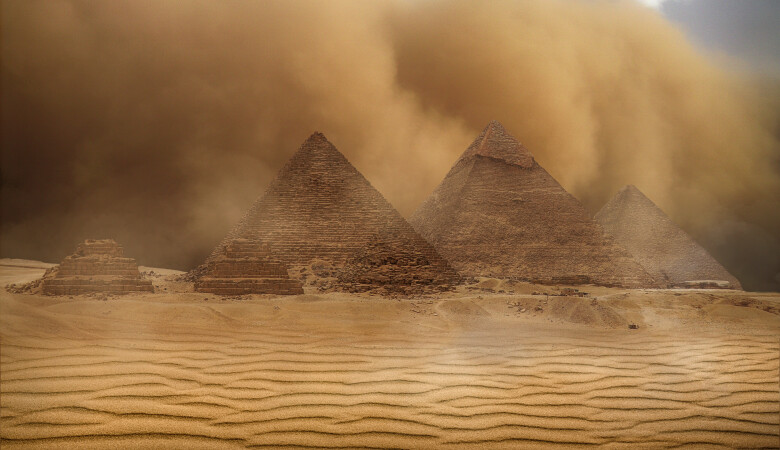The Temporary Empire of Cyrus Serves the Eternal Empire of Christ (Isaiah Sermon 52 of 80)
October 19, 2014 | Andy Davis
Isaiah 45:1-25
Prophecy
Andy Davis preaches a verse by verse expository sermon on Isaiah 45:1-25. The main subject of the sermon is God's mysterious plan to gather His people from a wicked world.
- SERMON TRANSCRIPT -
The current issue of World magazine, you may have seen it recently, (World magazine is a Christian form of Time magazine) has as the cover article Is the World Falling Apart? Thankfully, the magazine answers no, praise God, but we get a strong answer to that question right from Isaiah 45 this morning. Now, the issues that are on the minds of the authors of the article there and of the editors of World have to do with events going on in the Ukraine and events going on in the Near East, events going on in Syria and Iraq and in Israel. It doesn't mention Ebola, but you could extend that as well, as that's reaching a crisis level in parts of the world that are hard to even imagine. I read an article this week, Seven Rational Reasons to Panic About Ebola; it was a very depressing article.
Well, I thought throughout history, you could say seven rational reasons to panic about the rise of communism, or before that the invasion of Hitler and Poland, or seven rational reasons to panic about the beginning of World War I, or seven rational reasons to panic about Genghis Khan. Again and again throughout history there have been, it seems, rational reasons to panic. And again and again, God stands in the pages of Scripture and testifies that he is sovereign over all of this. The nations are churning like a roiling sea, and there's all of this discontent, and there's all of this disorder and this sin. But God rules over all of it for his glory. And this morning, we're going to look at how God raises up a temporary empire under Cyrus the Great to serve his purposes in raising up an eternal empire in Jesus Christ.
And we need to train ourselves to look at world events, look at world history, the things that are happening, whether crises of a biological nature like Ebola, or a crisis of a political, geopolitical nature like ISIS, or what's going on in Ukraine, or even crisis of weather, like Hurricane Katrina or other things like that, and look at it differently through the eyes of the sovereignty of God over all of these things. And Isaiah 45 is going to give us some significant insights into all of that. The amazing message of this chapter, and indeed of the whole Bible, is that God actively rules over every single event on the surface of the Earth; everything. He actively rules over the rise and fall of nations in particular, and that's something we need to keep in mind. God raises up empires, he raises up emperors and he brings them back down again. And as a matter of fact, no one can be a king, no one can be a ruler, no one can raise up an empire without the power of the sovereign power of God, whether that individual acknowledges God or not.
As in this text, it said several times that Cyrus doesn't acknowledge God. And it is very helpful and encouraging and strengthening to our faith to know that God does this, that God is the one that raises up empires and nations. He's the one that determines how long they'll last and when they will sink back down into the dust of history, as the Medo-Persian Empire has done. How do we know that? Well, there are number of places. Isaiah 45, that we're going to look at today, I think teaches it. But for me, probably the number one verse in the Bible that teaches this in a very succinct way is Acts 17:26. This is where the Apostle Paul, speaking at Mars Hill, talked about human history in this way: "From one man he made every nation of men that they should inhabit the whole Earth. And he determined the times set for them and the exact places where they should live."
Now, I'll tell you, if you meditate on that long enough, you'll understand how significant that statement is. God determines how long people live, where they live, what is going to be the extent of their domain. God rules over all of these things. It's amazing, in Deuteronomy 2:20-22, he talks there about some various people; this is where Moses is getting the Jewish nation ready to invade the Promised Land and take from it those Canaanite nations, to take it militarily, and God's going to go before them and give them military success. But God actually says, "I've been doing that with other nations, too, not just your own." He talks, for example, about the Ammonites, who drove out a people called the Zamzummites. And you're like, "Huh. What in the world do the Ammonites and the Zamzummites have to do with me?" Well nothing, they have sunk, as I said, back into the dust heap of history. But this is what Deuteronomy 2:21 says concerning the Zamzummites: "They were a people strong and numerous, as tall as the Anakites." Listen, "The Lord destroyed them from before the Ammonites, who drove them out, and settled in their place." Do you not realize the significance of that statement? That God was going before the Ammonites and driving out the Zamzummites. He's been doing that ever since. God rules over all of these things.
And so here in this chapter, Isaiah 45, God is saying that he gives to Cyrus a kingdom, that he's going to go ahead of Cyrus. That image is powerful, like the pillar of cloud and pillar of fire before the Jews. He's going to go ahead of Cyrus and go before Cyrus and give him a kingdom. He's going to give him military victories. And he's going to do it and he's going to speak of him... God is going to speak of Cyrus as his servant and his shepherd, even his anointed one, his Christ in the Greek translation. Though he does not acknowledge him.
And why is he doing all this? I say we step back and look big picture, God is doing this so that his elect people will know him and worship him and come to him for salvation and be saved even to the ends of the earth. That's what God is doing. He's ruling over history for the salvation of his chosen people. That's what this chapter's about.
I. God Grants Cyrus an Empire for the Salvation of His Elect (vs. 1-8)
So now let's dig in and look verses one through eight, God grants to Cyrus an empire for the salvation of his elect. Now, who is this individual Cyrus? For the second time, we have Cyrus the Great specifically identified by name. We've been looking at this for weeks now. These are the two chapters Isaiah 44 verse 28, "The Lord says of Cyrus," Koresh in the Hebrew, "he is my shepherd, and will accomplish all that I please. He will say of Jerusalem, "Let it be rebuilt and of the temple let its foundations be laid." And then again, we have Cyrus mentioned in 45 and verse one.
Who was Cyrus the Great?
So we have this individual mentioned by name, Cyrus, called in history, Cyrus the Great. Notice he's not called Cyrus the Great in the pages of scripture, because he is not great compared to the true king, who is coming, Christ, Christ is great. But Cyrus was a, according to the ancient historian, Herodotus, the grandson of a Median king named Astyages, ruler of the Median empire. Astyages had a dream about his baby grandson that one day he would overthrow him. So similar to King Herod, he sought to kill Cyrus the Great. But he officially delegated the task to an official but he couldn't do it, he couldn't kill this baby, and he gave him, he hit him with a shepherd instead. Wasn't until Cyrus was 10 years old, that king Astyages learned about this deception. But by then Cyrus' qualities had become known and he didn't want to kill him, Astyages didn't.
And so he let him and his mother live in exile. Well, in 554 BC, Cyrus led a revolt against his grandfather Astyages in fulfillment of the dream, and we would say in fulfill of the prophecies here in this chapter. He led a revolt and overthrew Astyages and effectively ended the Median empire. He then consolidated the Persians, and the Medes together into one world empire, the first of its kind in world history. And so it's called the Medo-Persian empire. He drew these officials together and they set out to begin conquest. He moved out to control the Mediterranean coastline, smaller kingdoms like the kingdom of Lydia ruled by the fabulously wealthy king Croesus who is one of the... Said to be one of the wealthiest kings in history, conquered all of them, one after the other.
They allied themselves to try to stop the Medo-Persian onslaught, but they couldn't do it. On October 12, 539 BC, Cyrus annexed the Chaldean or Babylonian empire, and on October 29th, he entered Babylon and arrested the king and assumed the title, their king of Babylon, king of Sumer and Akkad, king of the four corners of the world. I believe that put it all together that's the story told in Daniel 5. That very night, Belshazzar died in direct fulfillment of prophecy. Almost immediately then Cyrus the Great extended his control over the Arabian Peninsula, and over the middle east. They all submitted to Persian rule. Although Cyrus did not conquer Egypt by 535 BC, all the lands right up to the Egyptian border had submitted to him, and they began giving tribute to him. So that's who Cyrus the Great was in history.
Cyrus also had some enlightened policies for ruling his empire. He was the first empire to realize that it was in his own best interest to make everybody under his rule as absolutely happy and autonomous as possible. He wanted them to be content under Persian rule. The Romans would perfect that with the Pax Romana. It was a combination of their overpowering military strength, so if you revolt you're going to get crushed. Plus, "Hey life, isn't so bad. Things are going well. We have our own rulers really under the Caesars etcetera." And it was really Cyrus that saw the wisdom of doing that and that extended especially to religion.
He wanted the people to be able to worship their own gods and goddesses in their own way, and so he sent money from the treasury to allow temples of gods and goddesses to be rebuilt, and for religions to be established. Now, it was part of this policy that extended to the Jews and enabled them to go back to Palestine and re-build the temple of Yahweh, of Jehovah God. And this is directly recorded for us in Second Chronicles 36:22-23. It says there, "In the first year of Cyrus king of Persia, in order to fulfill the word of the Lord spoken by Jeremiah," we would add and Isaiah, "The Lord moved the heart of Cyrus king of Persia to make a proclamation throughout his realm and to put it in writing." Verse 23, "This is what Cyrus king of Persia says, 'The Lord, the God of Heaven has given me all the kingdoms of the earth and he has appointed me to build a temple for him at Jerusalem in Judah. Anyone of his people among you may, the Lord his God be with him, and let him go up, let him go up."
Now, Cyrus was a Pagan, he was a polytheist, he was a syncretist. He tried to mix as much religion together as possible. The idea of this is, "Who knows whatever gods or goddesses might be upset, let's appease them and make them happy." And you get this, I think, especially in something known as the Cyrus cylinder, which was discovered by an archaeologist in 1878. It's now in the British Museum in London. It's been translated and it shows how Cyrus seemed to believe in all the gods and goddesses. So while the Scripture does show Cyrus giving honor to the Jewish God, he seemed to do the same for every god. The Cyrus cylinder says something like the victorious Cyrus portrayed as having been chosen by the chief Babylonian god, Marduk, to restore peace and order to the Babylonians, that Cyrus was welcomed by the people of Babylon as their new ruler and it appeals to Marduk to protect and help Cyrus and his son Cambyses. The cylinder also says that, he repaired the ruin temples in the various cities that he conquered, restored their cults, their religions, and returned their sacred images as well as their former inhabitants, so that those gods and goddesses could be worshipped.
So, as Isaiah says plainly in our text, Cyrus did not acknowledge the true and only, the living God, but God still used it. Do you see? God ruled over this for his own sovereign purposes.
God Calls Cyrus His “Anointed” and Grants Him an Empire
Now, let's look very specifically at verses 1-3, there it says, "This is what the LORD says to his anointed, to Cyrus, whose right hand I take hold of to subdue nations before him and to strip kings of their armor, to open doors before him so that gates will not be shut: I will go before you and will level the mountains; I will break down gates of bronze and cut through bars of iron. I will give you the treasures of darkness, riches stored in secret places, so that you may know that I am the LORD, the God of Israel, who summons you by name."
Well, right in verse 1, do you not see how amazing this is, "This is what the Lord says to his anointed"? This is language reserved for a Davidic king. For us as Christians, this is language we reserve for Christ, the Anointed One, the Messiah. But he says he's going to take his anointed, Cyrus, by the right hand. He's going to lead him and give him success, and he's going to enable Cyrus to subdue every nation that opposes him. He's going to be able to cut through bars of iron and break down gates of bronze. He's going to be militarily successful. And God, he says, is going to go ahead of Cyrus, he's going to go before him to guarantee these victories. Like I said, the pillar of cloud and the pillar of fire leading the Jews, so God would lead Cyrus to victory, and he'll give him treasures hidden in darkness, maybe that's Croesus's gold down in some vault somewhere. He's going to give him all of the spoils of victory, everything that a pagan emperor could ever want, he's going to hand him the treasures of darkness. But he does this so that Cyrus and Israel and indeed all the earth may know that he alone is the true God.
God Does This So That Cyrus, Israel, and All the Earth May Know Him
So look at verses 3-6, he says, "I will give you the treasures of darkness, riches stored in secret places, so that you may know that I am the LORD, the God of Israel, who summons you by name. For the sake of Jacob my servant, of Israel my chosen, I summon you by name and bestow on you a title of honor, though you do not acknowledge me. I am the LORD, and there is no other; apart from me there is no God. I will strengthen you, though you have not acknowledged me, so that from the rising of the sun to the place of its setting men may know there is none besides me. I am the LORD, and there is no other."
And Isn't it powerful how God is speaking directly to Cyrus, talking to him? "I am God and I'm talking to you so that you may know me," speaking very powerfully and directly. That's the goal of all of this, that we may know the only true and living God that there is in the world. "That you may know me, that I have summoned you by name."
We know that at the beginning of these conquests, and as he received all of this military victory, Cyrus did not know the Lord. But is it possible that once Daniel got to be the second highest ruler in the Persian kingdom, that he might have evangelized him? Wouldn't it be delightful to find Cyrus up in heaven? Wouldn't it be delightful that God's purpose stated here, "So that you may know me," actually comes true, and that Cyrus is worshipping the true and living God for all eternity? Wouldn't you love to be Daniel rolling open the Isaiah scroll and saying, "Hey here's your name. And it was written a century before you were born." I would think that would have evangelistic power. Amen?
Talk about using fulfilled prophecy to win a convert. I would think Cyrus would be easy at that point. Cyrus had not acknowledged him. But do you see the significance of this big picture? God uses the movers and shakers of world history, whether they know him or not, whether they acknowledge him or not, whether it's Julius Caesar or Attila the Hun or Genghis Khan or Tamerlane, or all the way up to the 20th century, all of the great movers and shakers of the terrible events of the 20th century, God ruled over every one of them, whether they knew him or acknowledged him or not, all of them.
God gives them power, and then holds them accountable for how they use it. God rules over all of these things. Again, this is taught so plainly. You remember in Daniel chapter 4, when one of those mighty rulers, those emperors, the king of Babylon, Nebuchadnezzar, did not know God, did not acknowledge him. And so God gave him an education in that chapter. You remember the dream he had of the great tree that was cut down and all that? It led eventually to his mind being changed into that of an animal for seven years? Well, the point of the whole lesson in Daniel 4 was this, the angel said it, "So that you might know, that you might acknowledge that the Most High is sovereign over the kingdoms of men, and gives them to anyone he wishes."
Well, he learned that lesson. And at the end, Nebuchadnezzar said these words of God, "His dominion is an eternal dominion; his kingdom endures from generation to generation. All the peoples of the earth are regarded as nothing. He does as he pleases with the powers of heaven and the peoples of the earth. No one can hold back his hand or say to him: "What have you done?" That is the sovereign God. So, no, the world is not falling apart. God is ruling over every single event.
God Alone Creates Success and Disaster (vs. 7)
And Verse 7 is one of those "meat" verses that you can take the rest of your life chewing on, and you'll never fully comprehend it. But we must embrace it, we must read it, and we must take in its truth. Verse 7, "I form the light and create darkness. I bring prosperity and create disaster. I, the Lord, do all these things." This is one of the most difficult concepts in the Christian religion, it's under the heading of God's providence, God's sovereign rule over the events of everyday life.
And it goes right to the issue of light and darkness, prosperity and disaster, right to that issue. And it says directly that God does all these things. So, let's stick right with Cyrus's Medo-Persian conquests, and bring in the picture... Remember I said it's as though God were leading them as he was leading Israel with the pillar of cloud and the pillar of fire, you remember? You remember the night of the Red Sea crossing, how the pillar stood there and separated out God's people from the Egyptians, who wanted to kill them. You remember that? And how it said in that one night, the same pillar gave light to the one side and darkness to the other. You remember that? And so it is the same event in human history, can be light to the one and darkness to the other.
So let's just put it in simple terms. Let's say you were a soldier in the Medo-Persian army. Your conquest of Lydia or of the Scythians or of the Chaldeans, would have been light for you, and would have been prosperity for you. But if you were one of the Lydians or the Scythians or the Chaldeans, it would have been darkness and disaster. It's the same event, and God does it, and he knows exactly the impact it's going to have on your life. He's very well aware of that.
This destroys, I think, the immature, the doctrinally immature view of God that he only ever brings prosperity and light and sweetness and happiness to people. This is that "health and wealth" doctrine that we hear about, but I think it lurks in all of our minds. And if you think it doesn't, how do you act when you get what some call an adverse providence? Something comes that crosses you somewhat, that causes you inconvenience... Could be an illness, could be losing your job, a financial issue. It could be some major repair on the car, things that trivial really. Or it could be matters of life and death... And how it is that we are challenged by this statement. But look at it again, "I form the light and create darkness. I bring prosperity and create disaster; I the Lord do all these things." Now, here we must be very careful what we're saying. It says in 1 John 1:5, "God is light, and in him, there is no darkness at all." So God never does evil, ever. But he brings disaster, he kills people, he takes possessions away from people. It's just not evil.
It's just a different way of thinking. We have to understand this. God never does evil. I think when Hurricane Katrina came in, all of the bad theology that flowed after that, I couldn't believe it, on all sides of the equation. Those that said that God did bring the hurricane, and those that God... Said God didn't bring it. I'm not sure which hurricanes God brings and which ones he doesn't, which winds he controls. As far as I'm concerned, in the Bible, God's sovereign over weather, over all things. But it's simplistic to say that, let's say because of the great wickedness, specifically of New Orleans, that he brought Hurricane Katrina, as some theologians and pastors said. It's just simplistic. On the same street there are flattened houses, and some of those people are godly people, and some of them are unbelievers, and some of them are nominal Christians, and everything. And they're all getting the same thing. It's just too simplistic. But to say, "God would never do anything, it's only the devil, let's say, that would ever do something like that." It just isn't true. So we have to grow up, and we have to read a verse like this verse 7, and say, "I understand it."
The Lord Rains Down Righteousness and Makes It Spring Up
Now, look at verse 8, how he couples it. He says basically that everything God does is righteous. It's never evil, it's always righteous. Look at Verse 8, "You heavens above, rain down righteousness. Let the clouds shower it down, let the earth open wide. Let salvation spring up, let righteousness grow with it. I the Lord have created it." So, God does all these things, the Medo-Persian invasion, Cyrus, all that, hurricanes, earthquakes, everything. Everything that God does, he does so that he can bring about righteous salvation for his elect. That's the ultimate end, that God would be glorified by raining down from heaven whatever is necessary to let righteous salvation spring up. Isn't that beautiful? So, keep verse 7 and verse 8 together. What God is doing, it's apparently light and darkness to us, apparently prosperity and disaster, but look more deeply. In the midst of it, God is working out his saving purposes. He's causing righteous salvation to spring up from the earth, verse 8.
II. God Rebukes Arrogant Human Questioning of His Plans (vs. 9-13)
Well, verses 9-13, God says, "Okay, now I know you're ready to argue with me. I know you're ready to argue with me because you don't like what I'm saying to you. " This is God saying it, this is not the pastor saying this right now. I'm just saying, this is where we're going in the text, because he's very well aware that a verse like verse 7 is troubling. The idea, to the Jews, that God is going to raise up a pagan and give him the promised land and everything else and go before him and give him all this military success, "God, if you're so mighty and do that, why don't you do it for a Davidic king, a Jewish king? If that's what you can do, then do it for one of us." And God says in verse 9 and 10, "Woe to him who quarrels with his maker. To him, it is but a potsherd among the potsherds of the ground. Does the clay say to the potter, 'What are you making?" Does your work say, 'He has no hands?' Woe to him who says to his father, 'What have you begotten?' Or to his mother, 'What have you brought to birth?'"
So I think the immediate context here would be Jews, shocked to hear that God is going to use this pagan man to do all this. It's just difficult for them to hear God say to Cyrus, a pagan, "My servant, my anointed one, my shepherd," to call him that? It's difficult. "I don't understand what you're doing, God." And so, they start to question it. Now, more broadly applicable, when we have verse 7 kind of come down on our heads, and God, it seems, is bringing calamity to us, he's bringing darkness into our lives, and we're going through hard times, it is so easy to quarrel with your maker, isn't it? And so God proclaims a woe on those who quarrel with God, argue with God.
He challenges us. He calls us "potsherds on the ground" of the workshop, the potter's workshop. What's a potsherd? It's a piece of broken pottery. How is that like us? We were formed from the clay, from the dust of the Earth. And a potsherd's like something broken on the ground. We've been shattered in many ways by sin. And so for us, as a broken piece of pottery on the ground, to argue up to the potter himself is arrogant. Now, the apostle Paul picks up on this exact verse in Romans chapter 9, when he talks about God's sovereignty and salvation. And you remember that passage where God's going through, "Why are some Jews believing and some Jews aren't believing?" and that very deep passage? Romans 9 stands like Mount Everest over the theological landscape, and it's just got so many challenging statements in there. But in Romans 9:18, it says that God has mercy on whom he wills to have mercy, and he hardens whom he wills to harden.
And then Paul, the great teacher, says, "Now, one of you will say to me, one of you is going to argue back with me, why does God still find fault? Why does anybody ever get judged, for who resists his will?" But Romans 9:20, "Who are you, oh man, to talk back to God? Shall what is formed say to him who formed it, 'Why did you make me like this?' Does not the potter have the right to make out of the same lump of clay some pottery for noble purposes, and some for common use." Friends, that's grown-up theology. If we just take it simply at this point, don't argue with God. God is very patient, but in this text, he's saying, "Woe to you who does it." So don't argue, submit. And if you're going through a terrible trial, adverse circumstances, the quicker you bring yourself humbly and quietly under God's mighty hand, the quicker the healing will flow. The more you resist and fight and chafe and talk back to God, the longer that's going to take. You're just doing damage to your own soul.
Woe to Him Questions God About His Plans
And so, it's telling us not to argue with him, and not to question him about his plans. Look at verse 11 and 13, "This is what the Lord says, the Holy One of Israel, and its maker: Concerning things to come, do you question me about my children? Do you give me orders about the work of my hands?" Notice, verse 11 focuses on his children, his elect. God does everything for them. So he's saying, "Are you going to question me, what I'm doing with my children? Do you have the right to do that?"
And then Verse 13, "I will raise up Cyrus in my righteousness. I will make all his ways straight, he will rebuild my City." That's Jerusalem. Isn't that beautiful that God calls it "my city"? "He will rebuild my city and set my exiles free, but not for a price or reward, says the LORD Almighty." So, God does everything for the sake of his elect, for his children. He knows exactly what he's going to do.
In verse 12, he says, "Don't forget who I am, don't forget my power." Look at Verse 12. He says, "It is I who made the earth and created mankind upon it. My own hand stretched out the heavens. I marshalled their starry hosts." So never forget who I am.
III. God’s Mysterious Plans for Gentile Salvation (vs. 14-17)
Now, in verses 14-17, God speaks of his mysterious plans for gentile salvation. Look at verse 14, "This is what the Lord says, 'The products of Egypt and the merchandise of Cush, and those tall Sabeans, they will come over to you and will be yours. They will trudge behind you, coming over to you in chains. They will bow down before you and plead with you, saying, 'Surely God is with you, and there is no other. There is no other God.''" Now, this is not an easy verse. To a Jewish nationalist, let's say a Jewish zealot, they be like, "I love that verse. We've got the Gentiles trudging behind us in chains, and they're bringing us all their merchandise." Yes, but understand. God's purpose, his saving purpose has always been extending to the ends of the earth.
Remember the original call of Abram in Ur of the Chaldees? What does he say? He says, "I will bless those who, what? Bless you. And if one of these Egyptians or Cushites or tall Sabeans falls down in front of them, and says, "Truly God is with you, and there is no other, there's no other God," they're going to get blessed, friends. They're going to get blessed with salvation. Paul quotes this very thing in 1 Corinthians 14. You remember about the whole speaking-in-tongues thing? And if an outsider comes in, and they hear prophecy, they hear a clear proclamation of the Word of God, they're going to fall down in your midst and say, "Surely God is among you." he's quoting this exact passage. So ultimately, we're talking about gentile salvation, the Corinthians were Gentiles. And God in their midst, because they repent and believe in Christ.
God is a God Who Hides Himself
Now, your head may be swimming, saying, "This is just too complicated. This is too deep. God's ways are too high. I don't understand all the things he does. Well, look at the next verse, verse 15 is amazing, "Truly, you are a God who hides himself, oh God and Savior of Israel." So this is, I believe, Isaiah's editorial comment, saying, "Boy, I don't get it." [chuckle] Just like Paul in Romans 11, saying, "Your paths are beyond tracing out." "So you're doing all this stuff with Cyrus so that the people in Cush and the Sabeans can come to faith in Christ, and fall down and worship God?" "Yeah, that's exactly right." "Wow, your ways are difficult."
If you look at Verse 15 carefully, we're saying that God is a hidden God. He's a God that must reveal himself, or you will never know him. If God does not reveal himself... If you're, right now, a non-Christian, and God does not reveal himself to you, you'll walk out of here a non-Christian. But if God chooses to reveal his glory to you, in his Son crucified, and resurrection, you'll walk out of here saved. It's up to the sovereign plan of God. God is a hidden God who reveals himself in Scripture, and by the proclamation especially of the gospel. So this hidden God is mysterious.
And God's plan is shame for the idolaters and salvation for Israel. Verse 16 and 17, "All the makers of idols will be put to shame and disgrace. They'll go off into disgrace together. But Israel will be saved by the Lord with an everlasting salvation you'll never be put to shame or disgrace to ages everlasting." Sheep and goats dear friends. It's just wheats and tares, wheat and weeds, good fish and bad fish. God is going to separate out the committed final idolaters and they'll go off into everlasting shame from those who are truly saved, his people, his Israel, whether Jews who have come to faith in Christ, or Gentiles who have been grafted into a Jewish olive tree come to faith in Christ we will be saved with an everlasting salvation to ages everlasting. And how beautiful is that?
IV. God’s Gospel Call to the Ends of the Earth: Turn to Christ! (vs. 18-25)
And so there is a Gospel call to the ends of the earth, verses 18-25, God's purposes will be fulfilled and all the earth will be filled with worshippers, isn't that awesome? 18 and 19, "For this is what the Lord says. He who created the heavens, he is God, he who fashioned and made the earth, he founded it. He did not create it to be empty but formed it to be inhabited." Do you hear that?
God didn't make this Earth with all of its beauty to be a howling wilderness. He didn't create all of the mountains and the valleys and the rivers and oceans, and all that to not be seen, he wanted the beauty to be seen by people who will immediately worship him for it. He didn't form it to be empty or desolate, he wanted it to be inhabited, inhabited with who? With people created in his image, to know him, to love him, and to worship him. And so he says, "I am the Lord and there is no other. I have not spoken in secret from somewhere in a land of darkness. I have not said to Jacob's descendants, seek me in vain. I the Lord speak the truth. I declare what is right." Now here, a moment ago in verse 15, we had a God who hides himself, but now he says to Jacob, "I've not said to you, seek me in vain." And I'm going to put the two of those together, in just a moment. But God hasn't spoken off here in secret, he has given us this incredible book, and he's very, very good at getting it out.
Do you realize what percentage of the Earth's population can understand the scripture in some language that they know? It may not be their heart language, Wycliffe will say, not their heart language, but what percentage of the world population can hear and understand the scripture? 98% of the earth's population. 98%, there's 180 million people left who can't right now hear it in any language and so, Wycliffe's working on that. But God has done a very good job getting this book out. How many Bibles do you think there are on earth? The internet doesn't know. I looked this morning. They have no idea. They're guessing six billion Bibles. How could we even know? The book sale tell you it's about 100 million a year in America. That's amazing.
So all over the world, just hundreds and hundreds of millions of these, God is getting this word out. And Isaiah 45 is included, isn't that cool? Right there, God says, "I've not spoken this off in secret. I've gotten the word out." As it says in Romans 10, "Their voice has gone out into all the earth, their words to the ends of the world." People are hearing about this and God is saying, and he's saying, "Though I am a hidden God, if you seek me, you will find me, if you seek with all your heart." Isn't that beautiful, as Jeremiah talking to the exiles out in exile he said, "I'm going to send you to another land, and there you will bow down to foreign gods, but if in that land," Deuteronomy 4 says you seek me with all your heart, you will surely find me.
God’s Clear Challenge to Idolaters: God Alone Predicted These Things
So God gives a clear challenge to the idolaters. We've seen this before, so we don't have to spend much time on it. Verse 20 and 21, "Gather together and come; assemble, you fugitives from the nations. Ignorant are those who carry about idols of wood, who pray to gods that cannot save. Declare what is to be, present it-- let them take counsel together. Who foretold this long ago, who declared it from the distant past? Was it not I, the LORD? And there is no God apart from me, a righteous God and a Savior; there is none but me." So I would love to have been there when Daniel was evangelizing Cyrus and say, "Oh great king. It isn't Marduk, that predicted the future. It isn't Baal or Nebo or any of those false gods, it is the God of Abraham, Isaac, and Jacob, he's the only God there is."
And we can say the same thing in the 21st century scene, it's not the god of the Buddhist or the god of the Hindus or the god of Islam, that's predicted the future, God is the only God who has done this, who has said the name Cyrus. He is throwing down the prophetic gauntlet and saying, "No one else can do this." And why does he do this? So that the ends of the earth will turn to him and be saved for there is no one else. Now, here in this I hear the language of Acts 4:12, don't you? Peter saying to the Sanhedrin, "Salvation is found in no one else. For there is no other name under heaven given to men by which we must be saved." And so God sends this Gospel call to the ends of the Earth, and I'm going to say it quite plainly, "Turn to Jesus Christ and be saved all you ends of the earth." That's what he's saying.
The Exclusivity of Jesus Christ
In the fullness of time, we understand what this prophecy is saying. Look, 22 to 25, "Turn to me and be saved, all you ends of the earth, for I am God and there is no other. By myself, I have sworn, my mouth has uttered in all integrity a word that will not be revoked. Before me every knee will bow, by me every tongue will swear. They will say of me, 'In the Lord alone are righteousness, and strength, and all those who have raged against him will come to him and be put to shame, but in the Lord all the descendants of Israel will be found righteous and will exalt." Well, in the language of American evangelicalism, friends, verse 22 is the altar call of this chapter.
Calling on people who have heard these things to turn to the true and living God and be saved, all the ends of the earth. Turn means repent of your idolatries, repent of your sins, and your wickedness. Be saved means saved from the coming judgment and wrath of God. "Turn to me and be saved, all you ends of the earth," and God makes a pledge. He swears it by himself, "Before me every knee will bow." And "By me every tongue will swear." Now we don't understand this in terms of universalism, "everyone's going to be saved." But there will come a time that every human being will recognize that the God of Abraham, Isaac, and Jacob is the only true God. Now, again, if you're a Christian, these verses will sound familiar. Have you ever heard this before? Speaking of, Jesus Christ, "who being in very nature, God, did not consider equality with God something to be grasped, but made himself nothing. Taking the very nature of a servant, being made in human likeness, and being found in appearance as a man, he humbled himself and became obedient to death, even death on a cross. Therefore, God exalted him to the highest place, and gave him the name that is above every name. That at the name of Jesus, every knee should bow and every tongue confess that Jesus Christ is Lord, to the glory of God the father."
Now, I believe Isaiah 40-49 is the most fiercely monotheistic section of scripture in the entire Bible. God is determined to say he's the only God, and there is no other. He says it again and again and again, multiple times in this chapter. Yahweh, Jehovah, the God of Abraham, Isaac, and Jacob, that God, the God of the Jews, is the only god there is. But along comes Paul, and takes that and ascribes it to Jesus. That would be blasphemy if Jesus weren't God.
V. Applications
And so here's the application of this chapter. Look to Christ, turn to Christ and be saved. He is the only savior there is. This is Charles Spurgeon's conversion verse, by the way. When you get to heaven, you can say, "What was your conversion verse?" And Charles Spurgeon will say it's Isaiah 45:22. It was a specific snowy Sunday morning, and a primitive Methodist was there, the ordinary preacher was laid up or couldn't go or something. So they got this guy, Spurgeon... You got to read it. It's one of the funniest accounts in church history.
And he just reads about how this thin guy gets up, without any training, and just says in the KJV, "Look unto me and be saved, all the ends of the earth." And he said, "You look with eyes of faith, you look to Christ, you turn to Christ and you'll be saved. And Spurgeon, at once he said, "Suddenly the scales were gone from my eyes. I looked and I looked, until I could look my eyes away." He finally saw Christ crucified and resurrected as the only savior there is. Now, I don't know what your spiritual condition is, what brought you here today, but I know this. This Gospel is still powerful today. Look to Christ, there is no other Savior. And then, for us as Christians, we have a responsibility to take this same message out to the ends of the earth, even to the college campus, to the workplace through this week.
Now, other applications we've seen along the way, I'll just mention them briefly. Learn not to argue with God when things are going badly. Don't question him. Don't argue with him. Quickly humble yourself under his Hand, trust in him no matter what's going on. Don't argue with him. He knows what he's doing and he loves you. And understand that God brings both prosperity and disaster. Let's not be juvenile or immature in our theology, saying foolish things like that at hurricane times or earthquake times or invasion times.
God forms the light and creates darkness. He brings prosperity and disaster. He does all these things. And then finally meditate on the hidden-ness of God. Understand if God doesn't want you to know him, you won't know him. If God doesn't reveal himself, you'll never know him. But God has revealed himself in the Scripture and in Christ. So, though God is a God who hides himself, we are told later in the chapter that he has not told us to seek him in vain. Seek him with all your heart. Make it the daily bent of your life to seek this hidden God and know him. Close with me in prayer.































